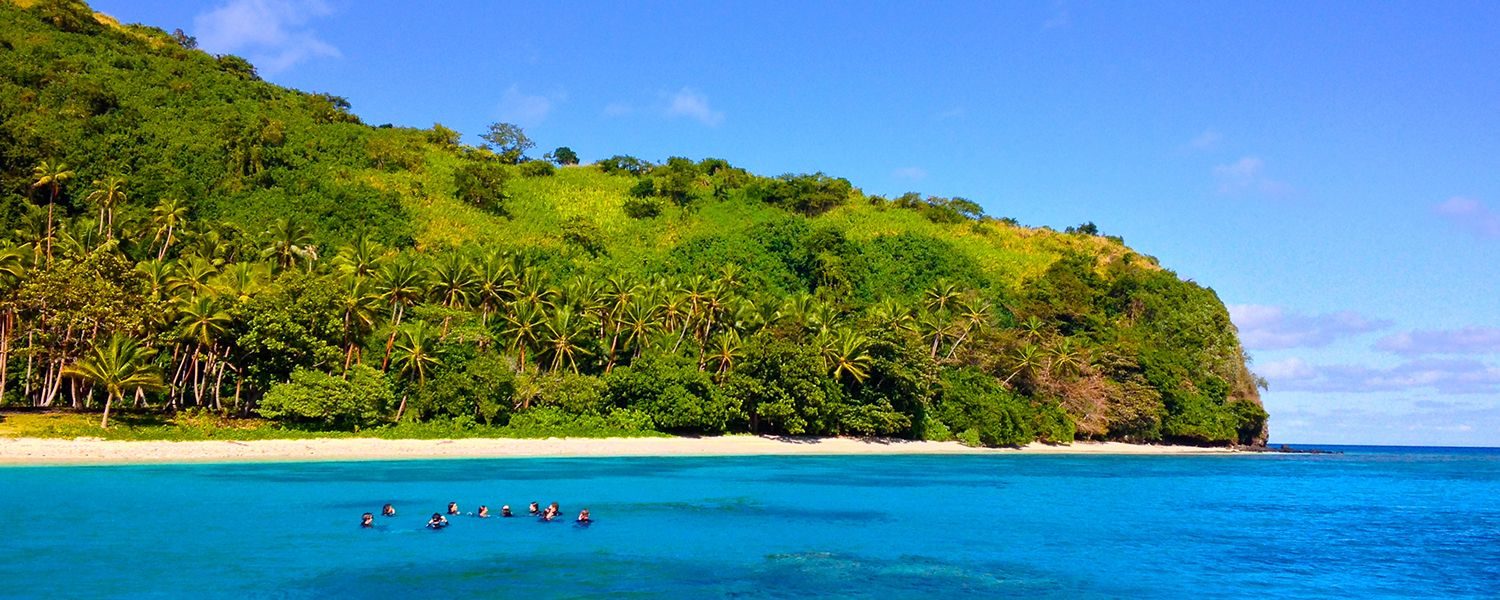
Memories of Fiji and the Solomons
By: Mariah Arnold, high school alumna January 23, 2020 High School Adventures, Scuba, Marine Biology
At first, the idea of spending three weeks in Fiji and the Solomon Islands in a totally foreign environment and sharing the journey with nine complete strangers worried me. Would I fit in? What if I lost something? What kind of people would I meet on these exotic islands? However, as the departure date crept closer and closer my anxieties were replaced by an excited curiosity. I started asking myself what kind of adventures the South Pacific would offer me. Unbeknownst to me at the time, I was in for a voyage of a lifetime.
The trip started with one of the countless airplanes I would fly on throughout the duration of the adventure… with a final landing in Gizo in the Solomon Islands. Looking down at the perfectly clear water at the coral reefs from the airplane, I knew that the diving here was going to be spectacular. We met Danny, our dive master, settled ourselves in the lodge, and dove straight into the wonderful culture of the Solomon Islands. The people on these islands are some of the friendliest and giving people I have ever come across. The only thing that took time getting used to was the cold showers. One unique opportunity came when Danny introduced us to the man who saved JFK when his boat, PT-109, sank off of Gizo during World War II. Also, just I had suspected, the diving was beyond words. When we did our check-out dive, I could scarcely contain my amazement at the incredible natural beauty of the coral reefs. The marine diversity blew me away. I took two rolls of film right away.
As the week progressed, it was so easy to fall in love with this place. Diving every day became the norm—one dive in the morning, picnic lunch on an island, one dive in the afternoon. In addition to awesome scuba diving, the snorkeling allowed us even more time in the water because the coral went right up to the beach. As we became more comfortable with the diving, we became more comfortable with each other. Friendships developed immediately. The group bonded spectacularly. The fun just kept coming, whether we were attempting to cook for the first time with a gas stove, going to the Friday island dances, or hanging out on the beach after diving on the Toa Maru Japanese WWII wreck.
Unfortunately, we had to leave Ghizo and head to the island of Munda. On the boat trip there, we stopped at another island for an excellent lobster lunch and a tour of Skull Island to see the cannibal shrines. It was a bit creepy to hike through the jungle, avoiding the rather large spiders, to suddenly come upon a stone mound whose niches were filled with skulls. I loved learning about the Solomon Islands’ history. Cannibalistic until around the 1950’s, the Solomon people ended their man-eating habits when missionaries came over to convert them to Christianity. We also found out that one of the native guides who worked for Danny was the son of a headhunter! The unique history of these people brought the islands to life.
When we arrived in Munda, the weather was rainy and the seas rough. Our spirits, however, were buoyed by the ever-energetic Echo who entertained us with her “hydration games.” Echo, Casey, and I enjoyed going to the morning market to buy fresh fruit and bread for breakfast. Casey and I even found a place to buy chocolate—a treat we had been greatly missing! One of my best memories of Munda was when we encountered a beautiful banded sea snake. The sleek predator was hunting in the coral heads. When I finally got my courage, I reached out to gently touch it. The snake continued on, ignoring my presence, leaving me utterly breathless. I will never forget that moment. On the land, we toured Munda’s jungles and saw the remains of the World War II battles. It was humbling to crawl inside a Japanese foxhole and imagine what it would have been like to live there for months.
We left Munda to head for the paradise island of Fiji. The lodge we stayed in, Bibi’s Hideaway, was by far the most comfortable. The family who owned the lodge invited us to their home every evening to listen to the guitar and drink kava. Kava is the traditional local drink made from roots and water. As always, we were excited to get diving and see how Fiji compared to the Solomons.
The diving in Fiji was colder and much more intense. The current was always strong, so we had to constantly be on our guard. Fortunately, the strong current carries the nutrients needed to support immense amounts of coral, so the underwater life was beyond amazing. Every day we saw rainbows above and below water. The colors of the soft corals were astounding. Fiji definitely earns its title of “Soft Coral Capital of the World.”
In addition to diving, we found other land-only activities to keep us entertained. Casey, Doug, and I found an excellent coffee and pastry shop run by the sweetest old woman, Audrey, who made the best chocolate cake ever. Also, we ocean kayaked, snorkeled, and played Frisbee. On the second-to-last day, we went on an intense jungle trek to see three magnificent waterfalls. At the third waterfall, we took turns jumping off a rock into the pool below. Finally, after washing off all the sticky jungle mud, we donned our sulus (traditional wraparound skirts) and headed for the village we would be staying in for the night. The children of the village were the first to greet us. It was wonderful to play with them. One of my most precious memories was when I tried to teach them my name. Pointing to myself, I said “Mia.” I don’t think that they understood me because immediately they each pointed to themselves and began running around shouting “Mia!” Even though there was a language barrier, I spent hours playing anything I could think of with those beautiful children. I will always cherish the innocent joy I share with them.
That evening, the villagers prepared a lavish feast, complete with whole octopus and sea snails marinated in coconut milk, along with the more familiar dishes of fish and rice. After eating, we joined the villagers in a round of singing, dancing, and kava. We performed the Electric Slide for them, amid hoots of laughter and giggling. Finally, the amazing night came to a close with all the Broadreachers snuggled into their sleeping bags or beds.
The next morning I woke to Casey’s gentle whispering. She pointed to the door. Framed in the doorway was the most striking sunrise I have ever witnessed. It was a fitting end to an unforgettable trip. We packed our smelly bags with heavy hearts and left for one last small adventure. Down the road from the village, we swam at another beautiful beach and rode on billybilly rafts. We laughed and had as much fun as we could, because we knew our time in the South Pacific was coming to a close.
Arriving at the airport, we had to say a tearful goodbye to Jason and Echo. I couldn’t have asked for better or more supportive leaders. We boarded our flight back to the U.S. and prepared for the long journey home. When we got to L.A., we had to go through customs. Many of our friends had to catch flights home as soon as we finished getting our bags, so we had to say farewell to Casey, David, Jacopo, Francesca, and Alex. The rest of us had plenty of time to kill so we took a taxi to nearby Santa Monica for a relaxing dinner. Finally, I had to leave. It is so hard to say goodbye to people you have grown to know as family.
When my plane landed in Orlando, I was so happy to see my family. I knew how dirty I was, so the hot shower waiting for me at home was a joyous occasion. I don’t think I stopped talking about the trip for three days. My pictures, both above and below water, turned out great. The trip to the South Pacific was not only a fun adventure; it gave me the chance to learn a lot about myself and others. Through Broadreach, I had the opportunity of a lifetime. Fiji and the Solomon Islands will always be a special part of me. I know that someday I will return to the South Pacific and begin a new chapter in the adventure of life.
